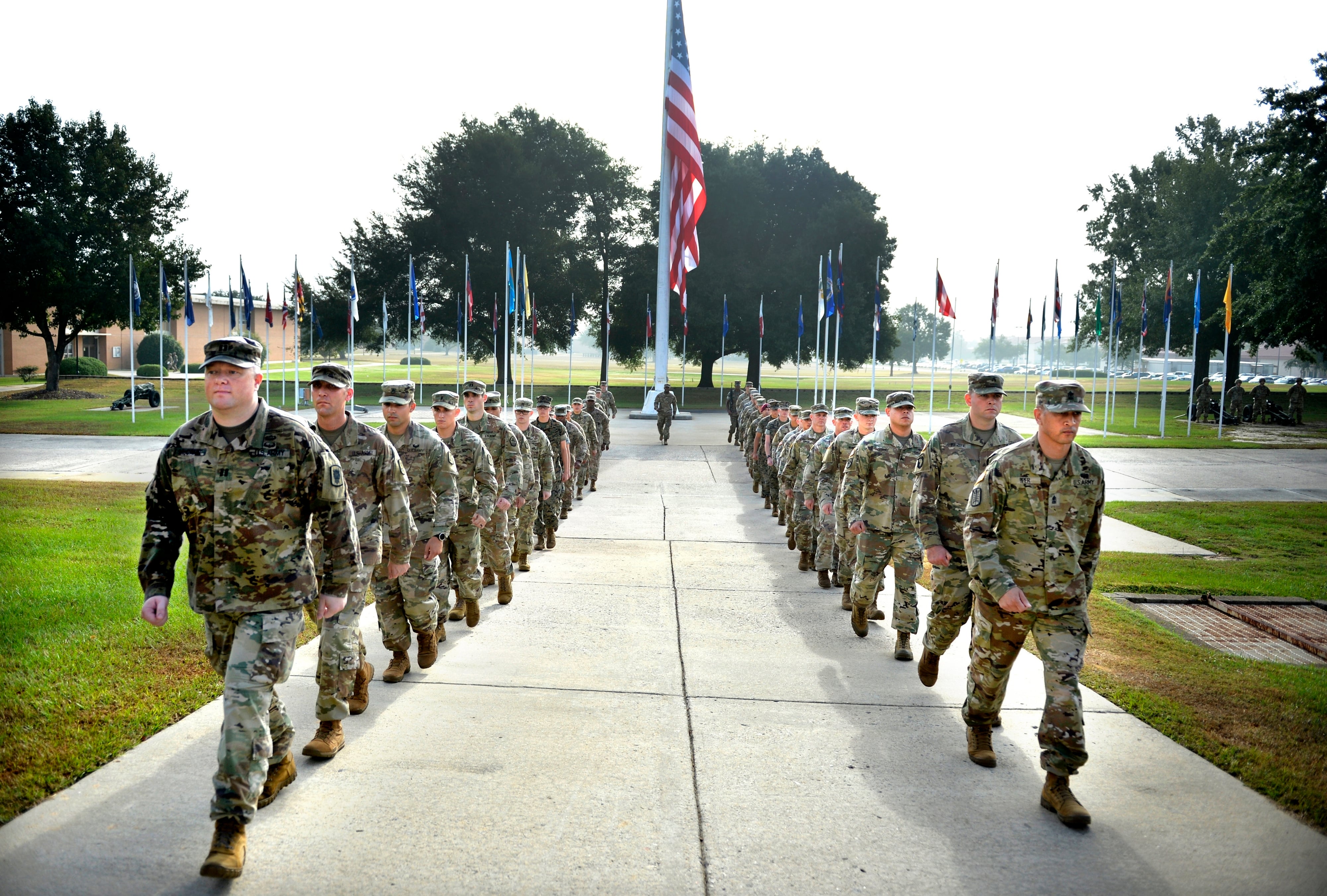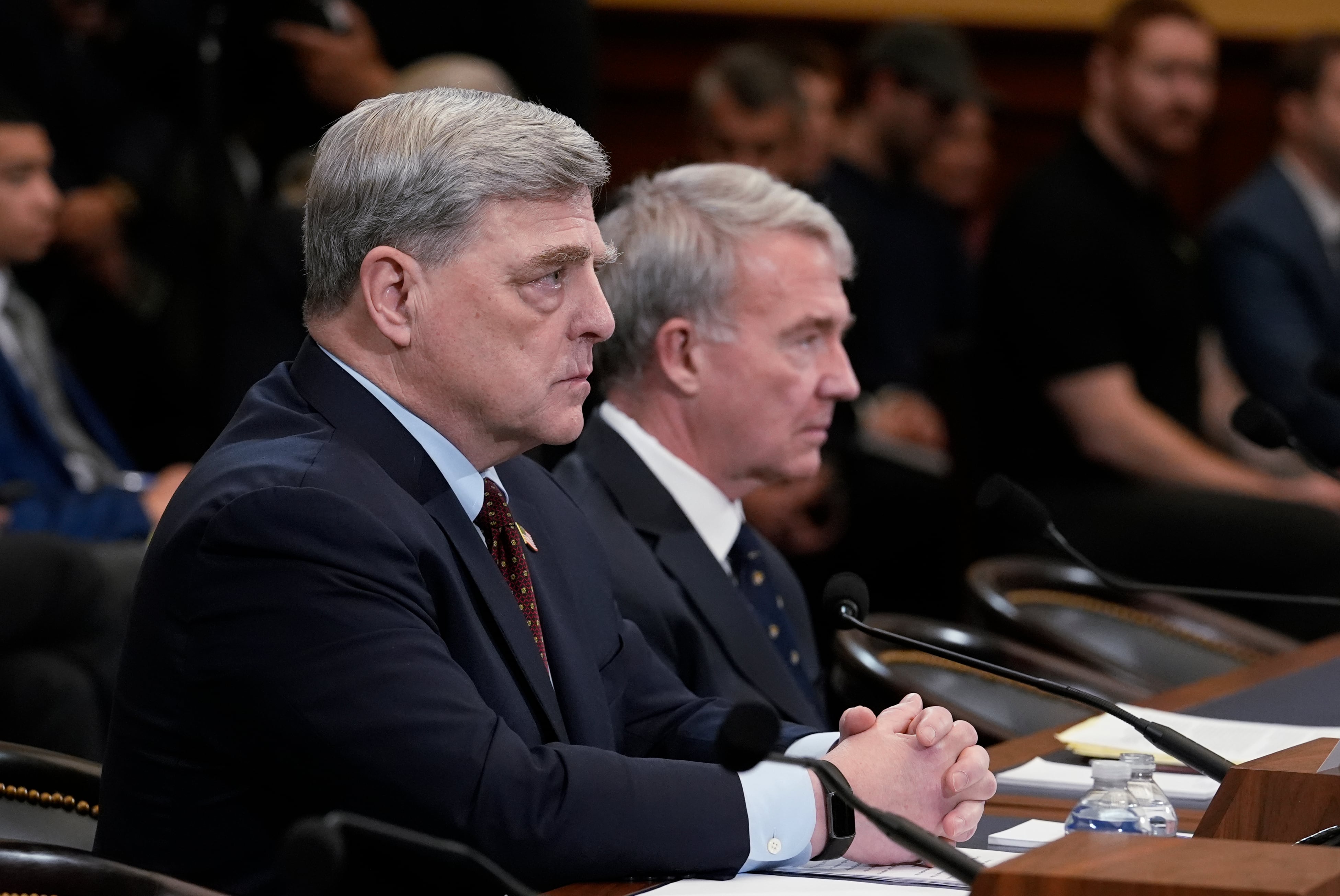The number of Guard troops mobilized in the effort to cope with the coronavirus pandemic continues to increase.
There are more 44,500 Air and Army National Guard professionals supporting the COVID-19 crisis response at the direction of their governors as of Monday afternoon. That’s an increase of about 800 from Friday.
In addition, 43 states, three territories and the District of Columbia have now been approved for use of federal funds for state missions under Title 32.
As of Monday morning, 792 Guard troops had tested positive for COVID-19, according to the latest figures provided by the Pentagon. That was an increase of 51 from Friday.
Of those troops activated in the COVID-19 response, 36,900 are currently under orders authorized for Title 32 502(f) status, said Army Master Sgt. W. Michael Houk, a spokesman for the National Guard Bureau. That’s an increase of about 900 troops since Thursday.
“As states amend orders and issue new ones based on their needs this number will keep moving,” he told Military Times. "Also based on response needs, as determined at the state level, some orders may remain under state active duty."
The status, ordered by President Donald Trump, means the federal government is picking up 100 percent of the cost, with control remaining in the hands of governors. It also means that those troops — risking thier health and that of their families by being on the front lines of the coronavirus fight — receive healthcare and increased housing allowance equal to active duty and reserve troops doing the same work.
There was an initial catch. Only troops on 31-day orders were eligible for the increased benefits. That problem, however, was since fixed by Trump and now states are going through the process of either initiating or amending those orders to meet the 31-day requirement for increased troop benefits.
In addition to those on Title 32 orders, there are also about 7,600 Guard troops across the nation on State Activated Duty who are not receiving increased benefits.
RELATED
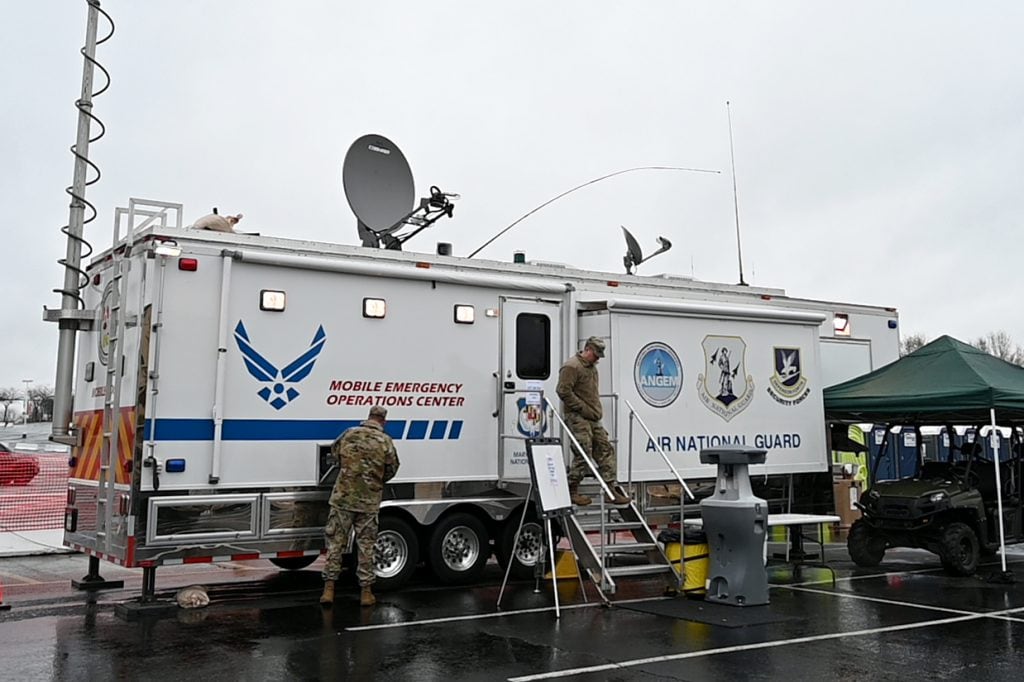
National Guard officials highlighted some of their efforts:
Members of the West Virginia National Guard (WVNG) and West Virginia University (WVU) John Chambers College of Business and Economics (Chambers College) have joined forces as "Task Force Petersen" to develop key data systems to forecast and track the availability, procurement, distribution and shortfalls of critical medical supplies throughout West Virginia during the ongoing COVID-19 pandemic.
Task Force Petersen, named after the supply sergeant in the John Wayne movie "The Green Berets" and aligning with the WVNG's Special Forces heritage, consists of six members from both the West Virginia Air National Guard (WVANG), West Virginia Army National Guard (WVARNG) with assistance from civilians at Chambers College. It was established to assist officials with the tracking, procurement and distribution of in-demand medical supplies, such as personal protective equipment (PPE), used across the state during COVID-19 response.
Once established, getting an accurate reading of the on-the-ground demand for both type and quantity of PPE needed by the various medical facilities, first responder and public safety agencies, and local health departments around the state was identified as one of the primary challenges the task force would face.
After the taskforce collected that initial data, the team then used models based on regional, state, and local information on current and expected spread of the disease, including data points such as population densities, healthcare bed capacities, and existing levels of available supplies, to forecast possible surge conditions should localized spikes or outbreaks happen.
Utilizing this data, officials in West Virginia can now order PPE and other medical supplies proactively to meet potential surge needs around the state, rather than reactively wait for a spike in cases to happen before fortifying local supply levels. Task Force Petersen also vets potential vendors and works to procure supplies to meet the forecasted demand.
Two soldiers in the Colorado National Guard saved a life April 14 while serving meals to those experiencing homelessness. Pfc. Harold Taylor, assigned to Joint Task Force Shelter Support at the Denver Rescue Mission, noticed someone choking.
“I could see the guest was having a tough time breathing, when suddenly the man made the universal choking sign of holding his hands around his neck,” Taylor said. “So I quickly turned the man around and proceeded to give him the Heimlich maneuver but I wasn’t able to dislodge the food.”
Army Pfc. Harold Taylor and Spc. Jo England, communications operators, Colorado Army National Guard, serve food to the guests at the Denver Rescue Mission, April 20. (Photo by Senior Master Sgt. John Rohrer)
Army Spc. Jo England, serving food alongside Taylor, noticed what was happening and moved to assist her teammate. Realizing the Heimlich maneuver wasn’t working, England attempted another tactic, smacking the man’s upper back to clear the blockage.
“I’ve seen health care workers at my full-time job do it before, and I’m CPR certified,” she said. “So I knew where to hit him in order for it to have the most impact and dislodge the food.”
Both fast-acting soldiers typically perform radio communications duties at their home unit, Headquarters and Headquarters Company, 1st Battalion, 157th Infantry Regiment, in Colorado Springs.
“I am so very proud of these soldiers for going above and beyond their duties to save the life of an individual experiencing homelessness in our city,” Denver Mayor Michael Hancock said. “They are living examples of the selfless dedication of the men and women serving in our Colorado National Guard.”
The New Mexico National Guard is helping support two alternate care facilities to keep New Mexico from exceeding its medical capacity during the COVID-19 public health crisis.
NMNG airmen and soldiers received, unloaded and inventoried a 250-bed federal medical shelter at the 150th Special Operations Wing hangar and began repackaging to support both a 50bed alternate care facility in Gallup and a 200-bed alternate care facility in Gibson.
The packages include everything to run a hospital, from cleaning gear to cots, IV equipment, walkers and oxygen. Beds are prepackaged with gown, bedsheet, pillow and blanket.
“Our soldiers and airmen have been working quickly and efficiently to get both these alternate care facilities up and running,” said Maj. Gen. Ken Nava, the adjutant general of New Mexico.
RELATED
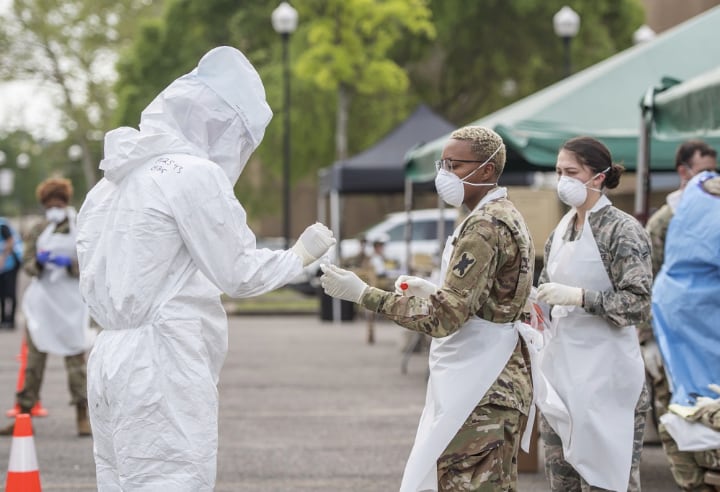
Current National Guard COVID-19 response missions include, but are not limited to:
*Full-time, 24-hour state Emergency Operations Center staffing to synchronize National Guard efforts with local and state mission partners to plan and execute an effective response;
*Flying ventilators and other critical equipment to support response efforts in other states;
*Providing mortuary affairs assistance as needed with dignity and respect;
*Providing time saving support to local law enforcement, freeing officers to perform their duty in the communities they serve;
*Conducting force health protection assessments to ensure our Guardsmen are taken care of;
*Manufacturing, sewing and distributing masks for mission essential personnel;
*Building and outfitting alternate care facilities to alleviate stress on medical infrastructure;
*Supporting warehouse operations and logistics efforts to help deliver and distribute lifesaving medical equipment and critical supplies;
*Delivering and distributing food in hard-hit communities and supporting food banks;
*Manning call centers to be a knowledgeable and calming voice;
*Providing vital personal protective equipment training and delivery to civilian first responders;
*Performing sample collection and delivery to medical personnel;
*Providing support and symptoms screening to testing facilities and passenger terminals;
*Providing transportation and assessment support to healthcare providers
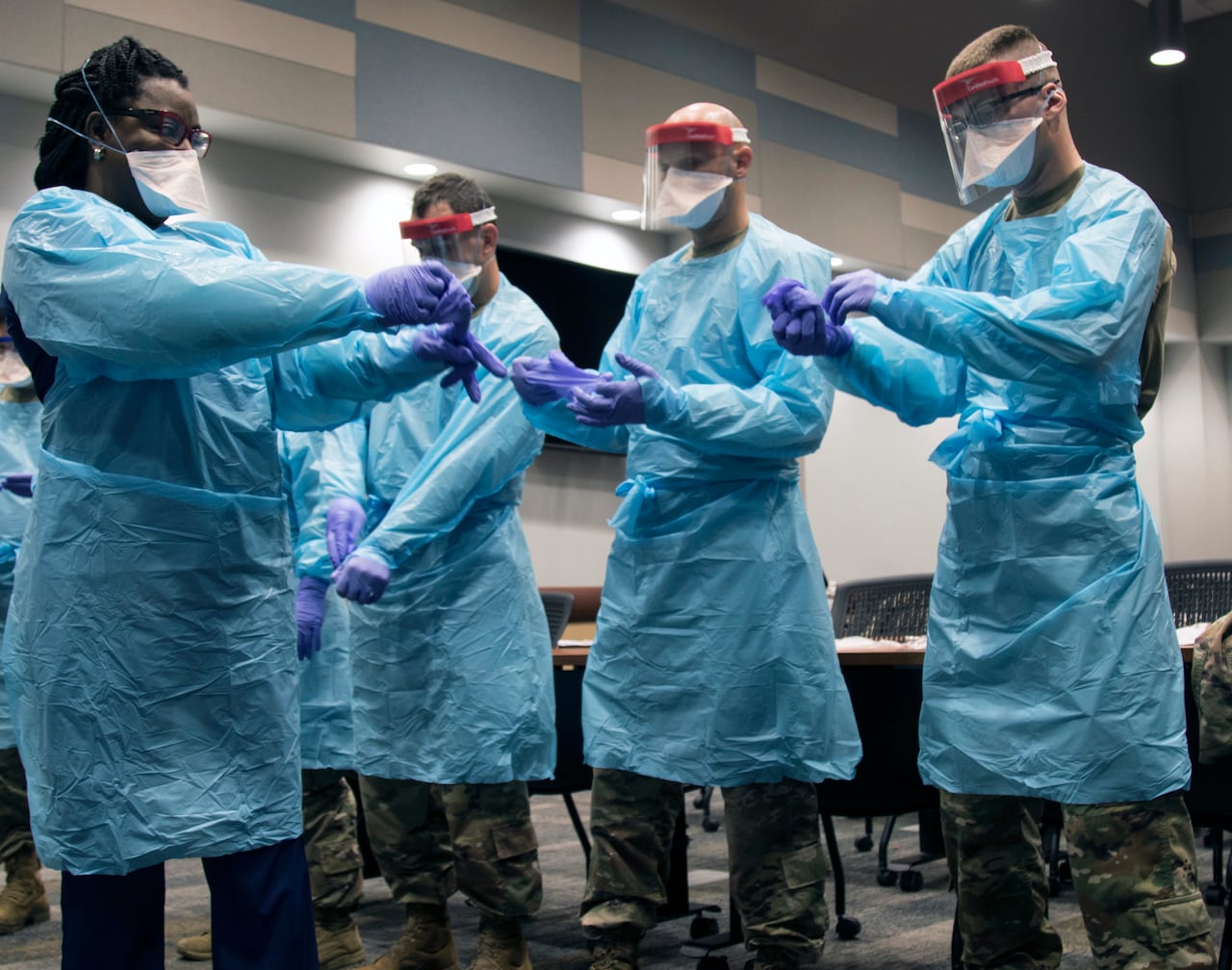
Here are the latest updates of National Guard actions across the United States and its territories:
Florida
The Florida National Guard has 2,903 soldiers and airmen in a mobilized status.
COVID-19 testing, both mobile and community-based testing sites, continues to be the main focus of the efforts, and has resulted in more than 86,850 completed tests.
Additionally, 93 FLNG medical professionals are supporting the U.S. Army Corps of Engineers’ alternate care facility at the Miami Beach Convention Center. The facility consists of a 64-bed, COVID step-down medical facility. The facility could be built out to 450 beds with augmentation from contract professionals.
Georgia
The Georgia National Guard has deployed more than 2,500 members to support the state’s COVID-19 response. Georgia Army National Guard soldiers are providing traffic management at the Georgia World Congress Center in Atlanta, which has been converted into a 200-bed alternate care facility.
Additionally, approximately 70 infection-control teams are disinfecting nursing homes, and 20 medical support teams are assisting hospital staff enabling them to focus on critical life-saving requirements. Hospital Entry Control Teams are also assisting hospitals by screening visitors at hospital entrances, as well as managing movement within facilities.
Teams specializing in infection control, medical support, hospital entry control, and testing collection are “purpose built” with capabilities generated in response to the public health state of emergency.
Guardsmen are packaging food items at 10 food banks, and delivering products to Georgians in need, from Dalton to Valdosta. Soldiers and airmen are also delivering food weekly to Atlanta Public School students while schools remain closed. This effort has resulted in the delivery of more 62,000 meals.
The GANG continues to partner with the Georgia Emergency Management Agency and the Georgia Department of Health to provide the service, support, and direct action necessary to mitigate the impact of COVID-19.
More than 200 Georgia National Guardsmen are assisting the Department of Public Health with testing citizens across the state. This new initiative includes 10 new mobile testing teams, also known as “strike teams.” These teams will deploy to hot spots in an effort to mitigate the spread of COVID-19.
The GANG strike teams intend to test 1,500 citizens per day, and have the capability to increase testing based upon the availability of test kits.
Michigan
820 Michigan National Guard personnel are actively supporting the state's COVID-19 response. An additional 6,600 National Guard personnel are ready to assist.
National Guard personnel are supporting requests from our local communities and state agencies across 13 counties. Response missions include:
*food distribution;
*screening operations; reception and staging;
*supply & logistics management;
*state emergency operations center staff augmentation;
*alternate care facility support
In addition, Joint Task Force – Michigan includes National Guard personnel to coordinate response efforts across the state.
New York
The New York National Guard has 3,627 airmen and soldiers on mission across the state. Members of the New York Guard (State Defense Force) and New York Naval Militia are also mobilized for the mission.
Six joint task forces are operating on Long Island, New York City, the Hudson Valley, Capital Region, Syracuse, and Buffalo to support state and local governments. A dual status command task force under the command of Brig. Gen. Michel Natali, the Assistant Adjutant General, Army, leads efforts to employ active and National Guard military resources in New York City.
The dual status command is supporting 2,700 military and civilian medical staff working at Javits and in New York City hospitals. Army soldiers of the 44th Medical Brigade are providing staffing at the Javits New York Medical Station.
Additional medical staff from the U.S. Army Reserve, the Navy Reserve, the Air Force, and the Civilian Medical Reserve Corps are also working at the alternate care site.
As of April 27, 1,093 patients have been treated at the Javits New York Medical Station. New York National Guard members continue to manage the Javits site as the unified command post for the multi-agency response.
New York Air National Guard pararescue airmen, who are trained as emergency medical technicians from New York's 106th Rescue Wing, are also civilian personnel in city hospitals.
The New York National Guard is supporting the alternate care facility at the South Beach Psychiatric Center on Staten Island. Additional forces are providing support at three other potential alternate care sites on Long Island and in Westchester County.
The New York National Guard continues to support 10 drive-through testing sites. There were 4,896 tests conducted April 25.
Sites are located at:
*SUNY Stony Brook;
*Jones Beach State Park;
*Staten Island, adjacent the Staten Island University Hospital;
*Glen Island State Park in Westchester County;
*The Anthony Wayne Service area in Rockland County;
*Lehman College and the Bay Plaza Mall in the Bronx;
*Aqueduct Racetrack in Queens
*SUNY Albany in Albany.
Soldiers and airmen are collecting samples and providing general-purpose support at the testing locations.
National Guard personnel continue food packaging and distribution today in the Bronx, Brooklyn, Queens, Staten Island, and Manhattan in New York City, and in Yonkers, providing 96,514 meals April 25. Soldiers have distributed 2,614,871 meals since beginning the mission.
Similar food distribution missions are underway in Westchester County but are on hold over the weekend. National Guard troops distributed 2,307 meals April 23, and have provided 82,490 meal packages since the start of the mission. In Albany County 2,432, meals have been delivered to quarantined residents, or picked up, as of April 23.
New York National Guard soldiers and airmen have been working at the regional food bank in Latham, N.Y. and have prepared 97 pallets of food for shipment across northeastern New York.
Soldiers helping to process and ship goods at the regional food bank in Schenectady, N.Y. delivered 1,711 meals as of April 23. A similar food distribution mission commenced in Chenango County April 21 and 2,804 meals have been distributed as of April 23. An additional food support mission was conducted April 24 in Amsterdam, Montgomery County, and 1,000 meals were distributed.
New York soldiers and airmen continue conducting logistics missions, including warehousing and commodity distribution of medical supplies at six sites in the Hudson Valley, the Albany area, and Mohawk Valley.
New York National Guard soldiers have distributed 3.8 million protective masks to five counties since the mission. At Stewart Air National Guard Base, soldiers working the warehouse mission delivered 338,000 gowns and 14,040 gallons of liquid soap April 25. 7,000 coveralls were delivered to SUNY Downstate Medical Center.
Soldiers are scheduled to deliver an additional 400,000 gowns, 4,000,000 masks and 25,225 pulse oximeters on April 26.
Hand sanitizer delivery to areas in the lower Hudson Valley is ongoing. On April 25, 253 gallons were dropped off at two locations in the lower Hudson Valley. A total of 48,906 gallons of sanitizer have been distributed since the start of the mission.
The New York National Guard continues to provide logistics support to the Office of the Chief Medical Examiner of New York City.
There are 250 New York National Guard personnel working with members of the Medical Examiner's Office to assist in the dignified removal of human remains when required. Soldiers assigned to the active Army's 54th Quartermaster Company are also providing staff assistance to the Office of the Chief Medical Examiner on New York City. Soldiers and airmen from a number of units are conducting this mission under the control of the 369th Sustainment Brigade.
The support mission also includes assistance to the counties of Westchester and Orange medical examiners.
Soldiers continue to man phones at two New York City call centers, including one for the New York City Division of Veterans Services. New York National Guard soldiers continue to provide administrative support at two New York City 911 call centers.
Soldiers continue packaging COVID-19 test kits for the New York State Department of Health at the Wadsworth Laboratory in Albany. They assembled more 33,500 kits April 25 for distribution across the state. The team has built 406,550 testing kits since starting the mission.
Virginia
The Virginia National Guard has more than 540 personnel supporting the commonwealth’s COVID-19 response. Soldiers and airmen are supporting planning teams and assisting with logistics in multiple Virginia Department of Emergency Management regions, and personnel are staged across the state ready to respond.
Soldiers are delivering supplies and helping with logistics at food pantries in the Fredericksburg area, as well as assisting with logistics at testing sites in the Roanoke and New River Valley areas. Soldiers and airmen are working directly with the Virginia Department of Health, training to provide additional capacity and capabilities for testing efforts.
West Virginia
Currently, more than 700 members of the West Virginia National Guard are on duty supporting the state’s COVID-19 response. To date, WVNG has completed 666 missions across the state.
Members of the WVNG provided PPE training to the West Virginia State Police. They continue to assist with N95 mask fit testing in Beckley and Parkersburg. To date, this team has trained 658 stores, 3,152 personnel, and 67 medical or long-term care facilities.
West Virginia Guard personnel assisting in sanitization lanes for first responder and public transport vehicles, have sanitized 156 vehicles in two locations – Huntington and Charleston – which includes ambulances, police vehicles and public transport buses.
In addition to sanitization of vehicles, a team of Guard personnel from Task Force Innovation conducted a pilot sanitization test of HVAC ducts using aerosolized hydrogen peroxide, April 24, at the Woody Williams Military Flight Operations Center in Charleston. This team will test the Federal Aviation Administration building this week to refine the process and identify additional processes or procedures for larger scale implementation.
WVNG members sanitized a daycare facility in Teays Valley April 25. Additionally, this team conducted the first restaurant sanitization mission in Charleston, April 26.
This story will continue to be updated as the National Guard Bureau releases daily reports on National Guard activities nationwide. If you or someone you know is in the National Guard responding to COVID-19, and would like to talk about your experience, please contact Military Times managing editor Howard Altman, haltman@militarytimes.com.
Howard Altman is an award-winning editor and reporter who was previously the military reporter for the Tampa Bay Times and before that the Tampa Tribune, where he covered USCENTCOM, USSOCOM and SOF writ large among many other topics.


